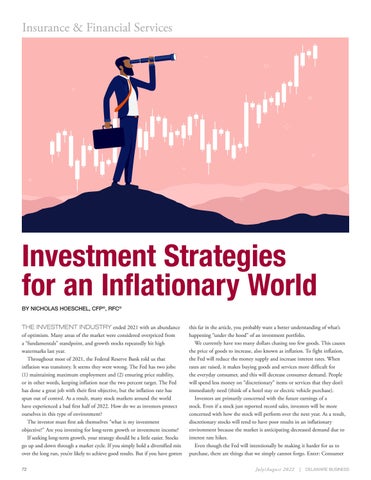Insurance & Financial Services
Investment Strategies for an Inflationary World BY NICHOLAS HOESCHEL, CFP®, RFC®
THE INVESTMENT INDUSTRY ended 2021 with an abundance of optimism. Many areas of the market were considered overpriced from a “fundamentals” standpoint, and growth stocks repeatedly hit high watermarks last year. Throughout most of 2021, the Federal Reserve Bank told us that inflation was transitory. It seems they were wrong. The Fed has two jobs: (1) maintaining maximum employment and (2) ensuring price stability, or in other words, keeping inflation near the two percent target. The Fed has done a great job with their first objective, but the inflation rate has spun out of control. As a result, many stock markets around the world have experienced a bad first half of 2022. How do we as investors protect ourselves in this type of environment? The investor must first ask themselves “what is my investment objective?” Are you investing for long-term growth or investment income? If seeking long-term growth, your strategy should be a little easier. Stocks go up and down through a market cycle. If you simply hold a diversified mix over the long run, you’re likely to achieve good results. But if you have gotten 72
this far in the article, you probably want a better understanding of what’s happening “under the hood” of an investment portfolio. We currently have too many dollars chasing too few goods. This causes the price of goods to increase, also known as inflation. To fight inflation, the Fed will reduce the money supply and increase interest rates. When rates are raised, it makes buying goods and services more difficult for the everyday consumer, and this will decrease consumer demand. People will spend less money on “discretionary” items or services that they don’t immediately need (think of a hotel stay or electric vehicle purchase). Investors are primarily concerned with the future earnings of a stock. Even if a stock just reported record sales, investors will be more concerned with how the stock will perform over the next year. As a result, discretionary stocks will tend to have poor results in an inflationary environment because the market is anticipating decreased demand due to interest rate hikes. Even though the Fed will intentionally be making it harder for us to purchase, there are things that we simply cannot forgo. Enter: Consumer July / Aug us t 2 0 2 2
| DELAWARE BUSINESS
